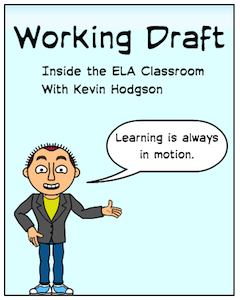Experiential Learning: Take Us to the River!
A MiddleWeb Blog
I know there are whole schools and school districts whose entire themes and philosophy are built upon the concept of outdoor adventure and experiential learning. They’ve created a year-long curriculum around the idea of students engaging in hands-on activities and in nature on a regular basis.
I wish we could do more of that because I often feel too much as if we and our students are chained to our classroom in ways that don’t benefit all of our kids.
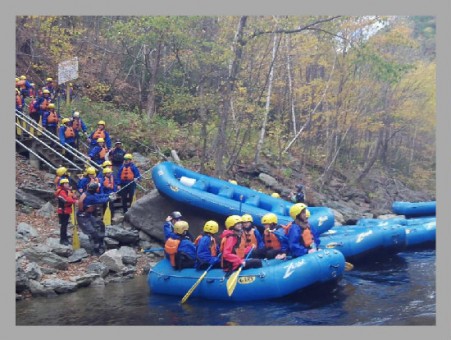
Twelve years ago, in an effort to add a thrilling adventure to our school year and as a way to create a memorable bonding experience for our sixth graders, we began an annual whitewater rafting trip for our students.
It has since become an early October tradition for us, and this year was no exception, as 75 students and six educators, plus hired rafting guides, hit the river just before Columbus Day weekend with the New England fall foliage in full effect.
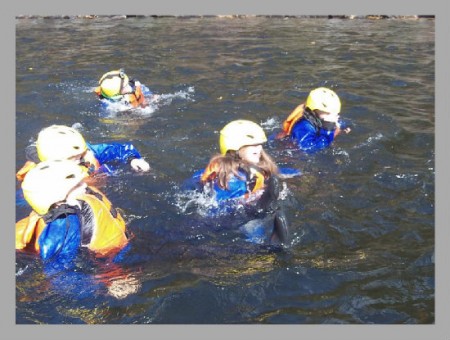
We raft a 10-mile stretch on the Deerfield River in Western Massachusetts with one area of Class III rapids (known the Zoar Gap). A hydroelectric dam upriver provides the bump in the water that makes rafting possible. As we float and paddle down the river, there are ample opportunities for cooperative games and activities, and even swimming, if one is brave enough for the cold water.
Our students on the rafts have to work together to get through the various rapids. They must listen to instructions, and they have to communicate. These are critical learning skills, made all the more important by the Common Core emphasis on speaking and listening standards.
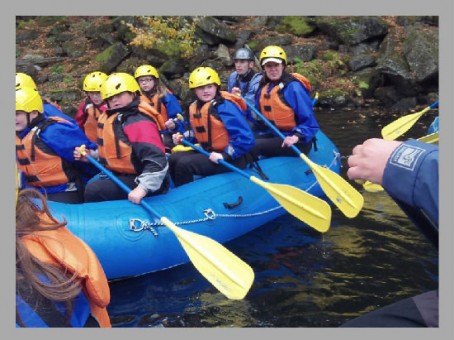
There’s plenty to talk about on the river during the course of the day, from views of unexpected nature (we saw the red and orange leaves in the midst of Autumn change, numerous beaver dams and even an osprey flying over us in search of lunch) and plenty of history.
Our guides are our teachers on this trip. The river even flows by the legendary Hoosic Tunnel, which was once one of the longest man-made tunnels in the country, and is now known more famously for its stories of being haunted (the kids love that).
The big picture take-aways
I was thinking on the long bus ride home from the river trip of some of the big picture lessons that we all have learned over the years from the experience of whitewater rafting with sixth graders:
- Nothing stays the same. This is always evident on the river, which is often hit hard by storms over the years. The water volume changes the river in many ways so that what we think of as familiar from past trips can seem strange and odd, with echoes of the past. Life is like that, too — a mixture of expected routine and unexpected surprises. The river is still beautiful, but the power of Mother Nature is on view everywhere we go.
- It’s good to get out of school. The rafting trip allows us teachers to bond with kids in a way outside the classroom setting. I can’t stress enough about how important this really is. On the rafts, we often see very different kids than the ones we see in the classroom.
- One of our aims is to get kids on the rafts to connect with others outside their normal friendship circles. I watch various students form bonds on the raft. They may know each other but they also may not really be friends. But on the river, they work together. They play together. They may not become best friends after the trip, either, but they will always have this adventure to fall back on when they interact. That’s a powerful thing that can resonate through the year and beyond.
- Boats can be “war boats” or “peace boats” when it comes to dowsing other boats with water (with buckets and paddles). It’s fascinating to watch how a boat of students decides what it will be, and how that designation might change during the course of the day, too. There’s a lot of negotiation that goes on. The United Nations would be proud.
- Maybe I think this just about every year when the trip ends, but we have a great class of kids. As the lead organizer, I am always worried about behavior and safety on this kind of trip. I should know better. They show their true colors. Teamwork, friendship, helpfulness, support, encouragement and more are all on display throughout the entire day. It’s another way to remember what a fantastic group of students we have. Truly.
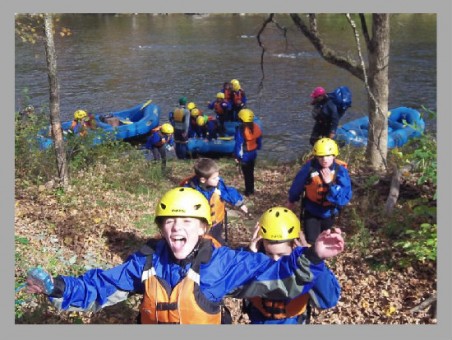
We’re off the river now, but the river still flows through us.

